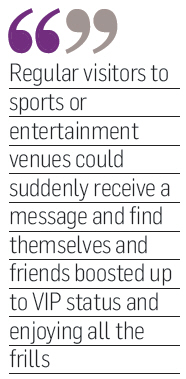Eugene Mitchell, director of new business at O2 in Ireland
The most exciting field of computing today is mobile. Smartphones herald a bright new future for personal computing and the marketing and advertising world is salivating at the prospect of being able to join together the worlds of social, location and e-commerce.
Tomorrow is ‘Black Friday’ in the US – the biggest shopping day of the year which traditionally occurs the day after Thanksgiving – and the biggest shift this year will involve millions of consumers using their smartphones to bring them directly to the deals they are looking for.
The chief combatants in the market are currently Apple, whose iOS owns 63pc of the Irish market, according to StatCounter, and Google, whose Android OS is used by 22pc of the market. Google has already begun offering near field communications (NFC) mobile payment services in the US via its GoogleWallet service.
Next year we may even see Facebook enter the market with its own signature phone, currently code-named ‘Buffy’, after the TV series’ vampire slayer.
Like all great market shifts, the key protagonists who stand to gain the most aren’t always obvious at first. Mobile operators whose networks will enable this incredible fusion of computing and commerce are determined to catch a slice of the action.
Ireland’s second largest operator, O2, is aligning itself with this new future in terms of its own business structures. Its parent company, Telefónica, is preparing for a future beyond just data, voice and text and sees itself as a player in areas like media and financial services.
The director of new business at O2 in Ireland Eugene Mitchell explains: “Within media there’s obviously areas like app development where we work with brands who want to find out better ways to communicate with employees, customers and other businesses. We already have those relationships.
“Another facet to that is mobile advertising. Clearly we have direct marketing potential through smartphones in terms of richer messages and video content to reach 1.7m customers in Ireland.”
Mitchell says O2 has just launched a large-scale location-based mobile marketing service and is working with brands like B&Q, Cadbury, Diageo, Littlewoods and Paddy Power.

– Eugene Mitchell,
director of new business at O2 in Ireland
Location-based marketing messages at work
O2 customers who have given their permission to receive location-based marketing messages will get messages based on their age, sex, location and interests. In the UK, some 6m consumers are being marketed to by O2 in this fashion.
“One of the trends we have noticed is that 62pc of users open these messages within five minutes. So there’s the real-time potential to deliver the message to the right person in a convenient way. So imagine they are in Littlewoods and they get notice of a deal that’s relevant to them while they are in that store. That is quite powerful, we believe.”
Mitchell said that geosensitive, opt-in marketing is the future and in the UK, brands like Sky, Starbucks, Harvey Nichols and WH Smith are using location-based marketing.
“A store could, for example, give a customer a unique code by mobile message the moment they are in the proximity of the store, offering them 20pc off something. Or regular visitors to sports or entertainment venues could suddenly receive a message and find themselves and friends boosted up to VIP status and enjoying all the frills.
“Then there are other opportunities, such as blending it with social, such as sending friends coupons for free pints of Guinness on
Arthur’s Day.”
Mitchell notes that in terms of financial services, O2 is close to hitting 60,000 users for its O2 money card. “We see the O2 money card as a journey towards eventually providing users with a wallet within their phone.
“When NFC arrives, it will open up the bricks and mortar world to new possibilities and a wider ecosystem,” he says, adding that O2 is aiming have working trials of NFC wallet services in place in Ireland by the first quarter of next year.